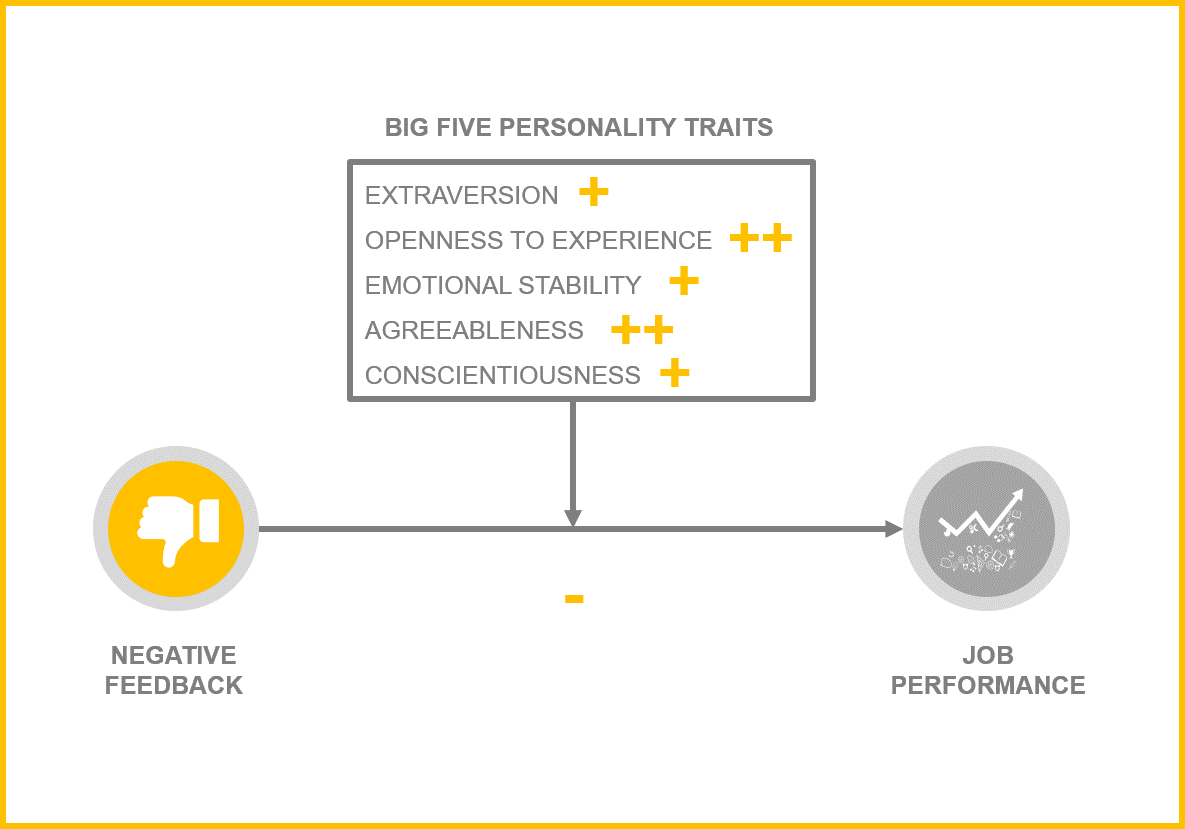Digest 7. Managers, get to know your people! How employee personality influences their performance after negative feedback
As we have seen in our previous digest 5, individual characteristics as feedback orientation (differences in receptivity to feedback) may impact people’s reactions to feedback and their subsequent motivation at work. This was an important finding as it contributed to a greater understanding that the feedback environment does not always provide the expected benefits: there are boundary conditions to it.
Hence, even though there are general guidelines on how to create a beneficial feedback environment, as described in our digest 1, feedback messages by supervisors cannot be “one size fits all employees”. It is critical to take into account how each person is different and may react to the same feedback in varied ways.
To account for these individual differences, we can look at personality traits and, specifically, at how different traits can influence employee reactions to feedback and consequent performance. To disentangle the complexity of personality, the well-known Big Five theory identifies 5 main traits (listed below) to describe a person. These traits have been associated with reactions to feedback and shape the way feedback impacts job performance in turn.
Guo, Zhang, Liao and colleagues (2017) shed light on this interplay between employee personality, negative feedback, and job performance. They surveyed 357 pairs of subordinates and respective supervisors from 15 Chinese enterprises on how often they received negative feedback and how well subordinates performed. Their study uncovered the following:
Extraversion denotes people characterized by outgoing/energetic behavior (vs. solitary/reserved), usually demonstrating self-confidence. People with high extraversion were found to perform better with negative feedback than employees with low extraversion, likely because they feel more at ease in discussing and asking for advice to improve performance;
Agreeableness describes people who are cooperative, helpful, compassionate, and selfless (vs. challenging/detached). Employees high in agreeableness were found to perform better in the presence of negative feedback than their colleagues scoring low on the trait, likely because agreeable people are inclined to please others by being responsive to their feedback. They are also likely to receive criticisms in a more open way and not to take feedback on a personal level.
Emotional stability refers to being restful, patient, mild, and confident/secure (vs. sensitive/nervous). High emotional stability was associated with better performance in presence of negative feedback. On the contrary, people with lower levels of this trait tend to easily experience negative emotions and are likely to be adversely influenced by negative feedback which can create self-doubt or blame.
Openness to experience is characterized by being curious and imaginative, finding it easy to accept novel ideas, and having extensive interests (vs. consistent/cautious). Employees high in openness to experience likely take advantage of negative feedback as they tend to embrace new knowledge, and to accept others’ perspectives and suggestions. Hence, they behave more successfully on the job when receiving negative feedback than individuals low on this trait;
Conscientiousness describes people who are responsible, dependable, diligent, and persistent (vs. easy-going/careless). This trait is associated with the inclination to be committed to the achievement of goals after receiving negative feedback, as these individuals tend to think that using feedback is their obligation and responsibility. Once again, highly conscientious employees displayed better performance after negative feedback than their counterpart.
In sum, this research revealed that the detrimental impact of negative feedback on job performance was less pronounced when individuals had high, rather than low, extraversion, openness to experience, agreeableness, emotional stability, and conscientiousness. Interestingly, agreeableness and openness to experience were the traits with the biggest impact.
Organizational implications
These findings highlight once more that managers need to be conscious of different employee personalities, rather than treating all employees similarly in the feedback context. If we combine the results from the Guo and colleagues (2017) study with the specific attributes of each personality trait, we can offer the following suggestions for managers and organizations:
Employees low in extraversion will likely have a greater preference for a private feedback conversation. Putting an emphasis on making the employee comfortable to voice their opinion and asking open questions will be important, as they are less likely to be proactive in communicating their views;
Employees low in agreeableness will likely be little cordial and cooperative in the feedback session. They will probably benefit even more than other people from receiving feedback that is centered around the tasks rather than calling into question personal characteristics;
Employees low in emotional stability will benefit from receiving very considerate feedback as they are sensitive to competence-related threats and may get demotivated quite easily. Moreover, a supportive and encouraging feedback that tries to develop a growth mindset will be even more crucial for these individuals to avoid that they ‘take it personally’ and ruminate about their negative feedback ;
Employees low in openness to experience will likely be more reluctant towards suggestions of change and improvement. As such, they may benefit from receiving highly specific feedback that offers tangible and small action steps;
Employees low in conscientiousness may have difficulties in identifying strategies to improve as they tend to lack persistence, organizational skills and focus. As such, supporting them in identifying goals and sub-goals for improving, as well as laying out with them possible strategies to implement can be a good approach;
In sum, managers can benefit from training their psychological skills that allows them to understand the relevance of personality and assess personality characteristics. An understanding of the personality profiles of their employees may help them to recognize who is most likely to be receptive to feedback and who needs more time and attention. Managers should also be trained to be prepared to deal with recipients’ defensive reactions to unfavorable feedback.
——
Reference: Guo, Y., Zhang, Y., Liao, J., Guo, X., Liu, J., Xue, X., … Zhang, Y. (2017). Negative feedback and employee job performance: Moderating role of the Big Five. Social Behavior and Personality: An International Journal, 45(10), 1735–1744. https://doi.org/10.2224/sbp.6478

